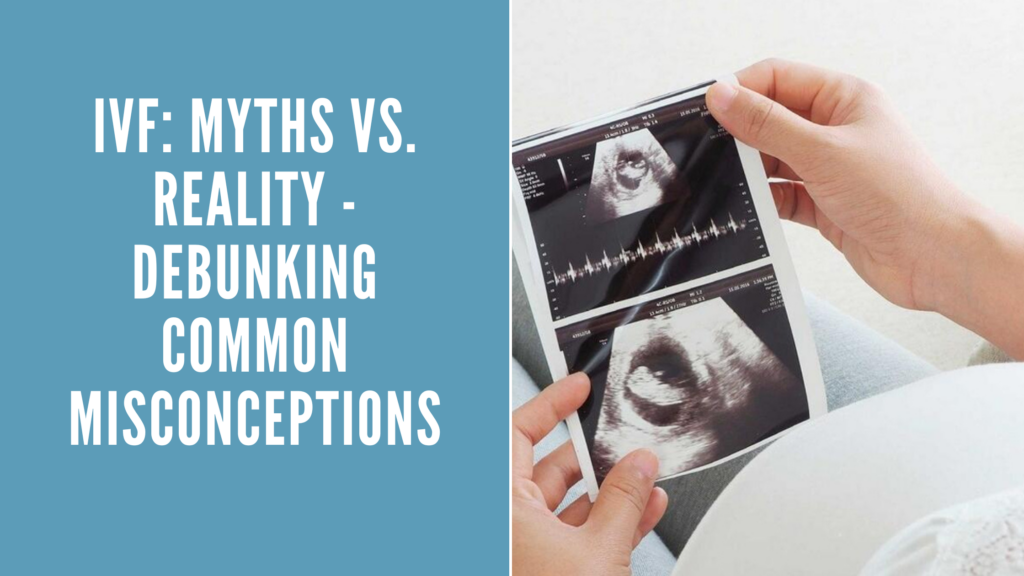
In recent years, In Vitro Fertilization (IVF) has revolutionized the field of fertility treatment, offering new hope to couples and individuals seeking to build their families.
But as with anything amazing, myths and misunderstandings have tagged along. Addressing and disposing of these fertility treatment misconceptions for reproductive wellness is essential.
In this blog, we’ll tackle common IVF myths, confront the realities, and uncover the truths behind the miraculous world of IVF.
Common myths about IVF
- In Vitro Fertilization (IVF) is a medical procedure used to help individuals and couples conceive a child when natural conception is challenging. There are several myths and misconceptions surrounding IVF.
Let’s explore some of these myths and the corresponding IVF facts:
Myth 1: IVF is only for female infertility
One of the biggest myths surrounding IVF is that it is only for female infertility.
IVF can be used for both male and female infertility. Indeed, IVF is often associated with female infertility, but it is also used when male factors affect fertility, such as low sperm count or motility.
In some cases, both partners may have fertility challenges, and IVF can be a viable option to achieve pregnancy.
Myth 2: You will have multiple babies through IVF.
This is another myth surrounding IVF. While there is a chance that IVF can lead to multiple pregnancies (twins, triplets, etc.), advances in technology and techniques have significantly reduced the likelihood of this happening.
Many IVF clinics now aim for a single, healthy pregnancy to minimize the risks associated with multiple births.
Myth 3: IVF causes birth defects.
Society has a bias that babies born through IVF are unnatural and, therefore, will have birth defects or developmental delays. This is a false notion.
Babies born through IVF are just as healthy as babies conceived through spontaneous conception. In fact, certain fertility factors, rather than the IVF procedure itself, might contribute to a slightly higher risk.
Myth 4: You can go for IVF at any age.
While IVF is a valuable option for many individuals and couples struggling with fertility, there are age-related considerations that need to be taken into account.
As a woman’s age increases, the quality and quantity of her eggs tend to decrease, directly impacting the success rates of IVF. Women over the age of 35, and especially those over 40, might experience lower success rates and a higher likelihood of pregnancy complications.
Myth 5: It requires hospitalization, and women require bed rest throughout the pregnancy.
IVF procedures, such as egg retrieval and embryo transfer, are typically outpatient procedures and do not require a woman to be hospitalized.
Once the conception has been successful, the amount of rest required by expectant IVF mothers is the same as any other woman. Of course, this differs case-to-case basis, depending on the patient’s health.
Myth 6: IVF pregnancies have increased complications and lead to cesarean delivery.
One must remember that an IVF pregnancy is no different from a spontaneous one, and the need for a cesarean may arise due to certain complications, not due to IVF.
However, babies conceived are considered “precious” due to a long battle against infertility. Therefore, couples often go for an elective or planned cesarean delivery to ensure safe delivery.
Myth 7: If one IVF cycle fails, you cannot conceive again.
Sometimes it may happen that your IVF cycle will not result in pregnancy. The situation can be heartbreaking for couples, but it is not the end of the road.
Many individuals who experience unsuccessful IVF cycles go on to achieve success in subsequent cycles. It’s important not to lose hope after one unsuccessful attempt.
Your doctor can provide guidance, analyze the reasons for the lack of success, and develop a new plan for future attempts based on your situation.
It’s important to gather accurate information from reputable sources and consult a fertility specialist when considering IVF or other fertility treatments. Every individual’s situation is unique, and a healthcare provider can provide personalized guidance based on medical history and needs.
Visit Oasis Fertility for IVF treatment.
If you are struggling with infertility, visit Oasis Fertility.
With over 30 years of experience and top-notch infrastructure, Dr. Imran Pirwany and his team extend quality care in a supportive and empathetic environment. Oasis fertility clinic makes your journey to parenthood pleasant while providing a proficient line of treatment for infertility.



